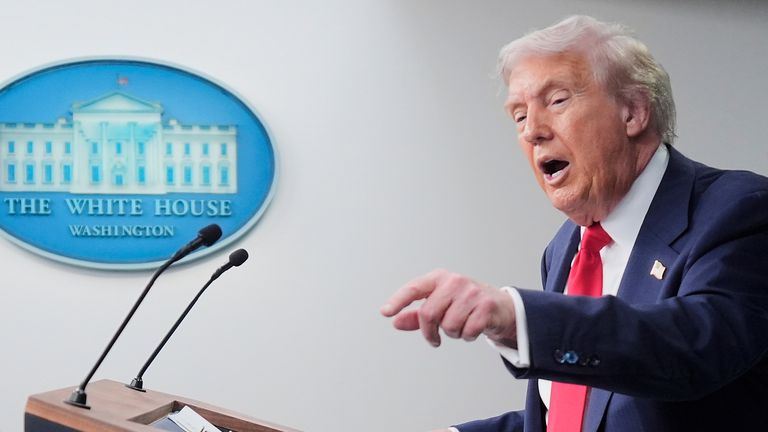When Trump took the stage during Climate Week in New York City, the world was bracing for blunt words. Few, however, expected just how explosive they would be. With the eyes of environmental leaders, scientists, and policymakers upon him, Trump declared climate change a “con job” and announced the rescission of $13 billion in renewable energy funding.
The moment immediately reverberated across the globe. For many, it marked a definitive split between Washington and the international consensus on climate action. For others, it was a bold reaffirmation of Trump’s longstanding skepticism toward what he views as burdensome environmental regulations. Either way, the speech has become a focal point of debate—not just about climate change itself, but about America’s role in the world and the competing visions of economic growth, science, and responsibility.
Climate Week NYC: A Global Gathering
Climate Week NYC has grown into one of the most important environmental events on the global calendar. Hosted annually alongside the United Nations General Assembly, it brings together heads of state, corporate executives, climate activists, and researchers. Panels, summits, and demonstrations converge across New York City, transforming it into a stage for the fight against climate change.
This year’s event was especially charged. With record-breaking heatwaves scorching Europe, unprecedented floods hitting Asia, and wildfires devastating parts of North and South America, the urgency of the climate crisis was more visible than ever. Governments were expected to step up with new pledges. China unveiled a plan for stricter emissions caps, while Brazil announced a billion-dollar commitment to protecting its rainforests. African nations called for major investment in renewable infrastructure, linking climate justice with economic development.
Into this atmosphere walked Donald Trump.
Trump’s Message: Climate Change as a “Con Job”
Trump’s speech was characteristic of his style: blunt, uncompromising, and calculated to shock. He dismissed decades of scientific research, arguing that climate change was exaggerated, if not outright fabricated, by political elites. He called environmental regulations a drag on the economy and branded renewable energy subsidies as a colossal waste of taxpayer money.
The centerpiece of his announcement was the immediate rescission of $13 billion in federal renewable energy funding. This funding had been earmarked for a wide range of projects—solar farms in the Southwest, offshore wind initiatives along the Atlantic coast, and cutting-edge research into battery storage technologies. By canceling it, Trump sent a clear signal that under his leadership, the United States would pivot away from subsidizing green energy in favor of expanding fossil fuel production and reducing government spending.
For supporters, the move was overdue. They argue that renewable energy projects are often inefficient, heavily reliant on subsidies, and unable to provide the reliable base power that oil, gas, and coal deliver. To them, Trump’s stance is one of realism: prioritizing immediate economic growth and energy independence over what they view as costly, speculative ventures.
For critics, however, the decision was nothing short of disastrous.
The Backlash: Outrage From Environmentalists and World Leaders
Within hours of Trump’s remarks, condemnation poured in from across the globe. Environmental groups denounced his words as reckless, warning that they would embolden climate deniers and stall critical progress. “This is the most dangerous kind of leadership,” one activist declared at a rally outside the United Nations. “It tells the world that the second-largest polluter is walking away from the table just as the crisis reaches a boiling point.”
World leaders expressed frustration and alarm. The European Union reaffirmed its commitment to achieving net-zero emissions by 2050, with one official noting that “the absence of U.S. leadership makes our work harder, but not impossible.” Chinese officials highlighted the contrast, presenting their new targets as evidence of global responsibility. Brazil’s pledge to invest in rainforest preservation was framed explicitly as a counterpoint to Washington’s retreat.
Even within the United States, the backlash was significant. Governors from California, New York, and Massachusetts vowed to continue renewable energy initiatives independently, promising that states would “not back down” regardless of federal cuts. Corporate leaders in industries like automotive manufacturing and tech, many of whom have already bet heavily on electrification, also voiced concern.
A Familiar Stance With New Consequences
Trump’s skepticism toward climate change is not new. During his presidency, he withdrew the United States from the Paris Agreement, rolled back environmental protections, and frequently ridiculed renewable energy projects. But this time, the context is different.
The world has moved forward in the years since Trump left office. Renewable energy costs have plummeted, making solar and wind competitive with fossil fuels in many markets. Electric vehicle adoption has accelerated, driven by both government policy and consumer demand. Internationally, countries from Europe to Asia have doubled down on their commitments, creating a momentum that even skeptics acknowledge is difficult to reverse.
By labeling climate change a “con job” in 2025, Trump is not just repeating old arguments—he is actively rejecting a global movement that has gained unprecedented traction. The rescission of $13 billion in funding represents not only a symbolic break, but a tangible step backward at a time when the stakes have never been higher.
The Stakes for Innovation and Industry
One of the most immediate concerns is the impact on innovation. Federal funding has historically played a vital role in developing new technologies, from the internet to GPS to medical breakthroughs. Renewable energy research, critics argue, falls into the same category: a long-term investment with wide-reaching benefits.
The canceled funding included projects exploring next-generation solar panels, advanced wind turbine designs, and breakthroughs in battery storage—technologies that could make renewable power more reliable and scalable. Without government support, many of these initiatives may falter, slowing the pace of innovation just as the world races to decarbonize.
Industries are also caught in the crossfire. Automakers betting on electric vehicles worry that a weaker renewable infrastructure will hamper charging networks. Utility companies that have already invested in wind and solar projects face uncertainty. Meanwhile, fossil fuel companies see an opportunity to reclaim ground lost in recent years, potentially expanding drilling and production.
The tension reflects a larger question: what kind of economy does America want to build for the future?
U.S. Leadership in Question
Beyond economics, Trump’s remarks have rekindled debates about America’s role in the world. For decades, U.S. exceptionalism has been tied not only to military power and economic might, but also to the perception of leadership on global challenges. From postwar reconstruction to the space race to public health, Washington has often set the pace.
By stepping back from climate commitments, critics argue, the U.S. risks ceding leadership to others. China, in particular, is eager to position itself as the champion of renewable energy, already dominating markets in solar panels and electric vehicles. European nations, too, are advancing aggressively, setting ambitious emissions targets and investing in green technologies.
If the U.S. retreats, it risks being seen not as the innovator but as the laggard—a perception that could have long-term consequences for its influence in global markets.
Supporters’ Case: Economic Growth Over “Green Agendas”
Trump’s supporters, however, frame the issue differently. To them, the obsession with climate change has led to wasteful spending and unnecessary regulation. They argue that renewable energy remains unreliable, dependent on subsidies, and often unable to deliver power when it’s needed most.
By cutting $13 billion in funding, they claim Trump is protecting taxpayers and refocusing government priorities on economic growth, energy security, and job creation. Fossil fuel industries employ millions and provide stable, high-paying jobs, especially in regions where alternatives are scarce. Trump’s camp insists that these industries cannot simply be abandoned without devastating social and economic consequences.
The message resonates with many voters who feel left behind by globalization and skeptical of elite narratives. For them, climate change is not a pressing emergency, but an abstract concern overshadowed by everyday struggles with cost of living, employment, and security.
The Science vs. the Politics
At the heart of the controversy lies the clash between science and politics. The overwhelming majority of climate scientists agree that human activity is driving global warming, and that urgent action is needed to prevent catastrophic consequences. Reports from the Intergovernmental Panel on Climate Change warn of severe disruptions to weather patterns, agriculture, and infrastructure if emissions are not curbed.
Trump’s dismissal of these findings reflects a broader skepticism among some political groups toward scientific institutions. This skepticism is not confined to climate change—it extends to public health, education, and other areas where expertise collides with ideology.
For scientists and activists, the danger is clear: when political leaders dismiss evidence, it undermines the ability to respond to crises effectively.
The Human Cost: Heatwaves, Fires, and Floods
The debate is not abstract. In recent years, the world has witnessed climate impacts with increasing frequency and severity.
Record-breaking heatwaves have killed thousands across Europe and Asia. Massive wildfires in California, Australia, and the Amazon have destroyed communities and ecosystems. Floods in South Asia have displaced millions, while hurricanes and typhoons devastate coastal regions with growing intensity.
These events serve as stark reminders that climate change is not a distant threat—it is a present reality. Against this backdrop, Trump’s words struck many as dangerously disconnected from lived experience.
The Global Divide
Perhaps the most significant outcome of Trump’s speech is the deepening divide between the United States and much of the rest of the world.
While China, Brazil, and European nations step up their commitments, Washington’s retreat raises doubts about whether international targets can be met. Climate diplomacy depends on collective action, and without the U.S., momentum slows.
This divide also has cultural dimensions. Younger generations around the world increasingly view climate action as a moral imperative. In contrast, Trump’s base often sees it as an elite project detached from everyday concerns. The clash reflects not only political differences, but generational and cultural ones as well.
Conclusion: A Defining Moment
Trump’s remarks at Climate Week may be remembered as a defining moment in the global climate debate. By calling climate change a “con job” and cutting $13 billion in funding, he crystallized the divide between those pushing for urgent action and those skeptical of its necessity.
The consequences will unfold in the years to come. Will the U.S. cede leadership in renewable technology to others? Will innovation slow without federal support? Will international cooperation fracture under the weight of political divisions?
For now, one thing is clear: the world is watching. And the question is no longer just whether climate change is real, but whether humanity has the will to confront it together—or fracture along the lines of politics, ideology, and power.

